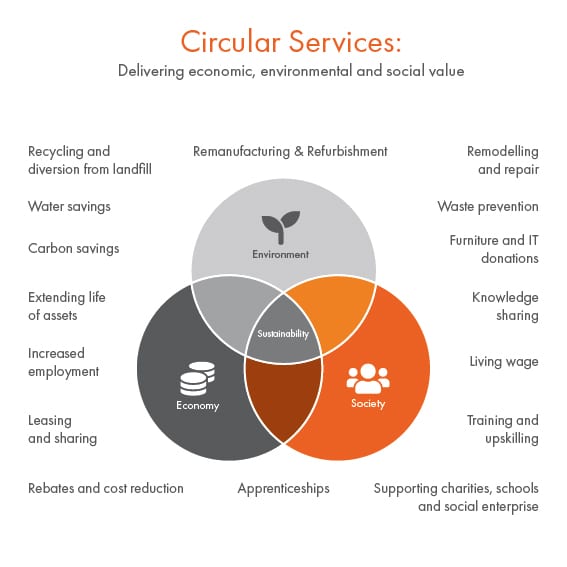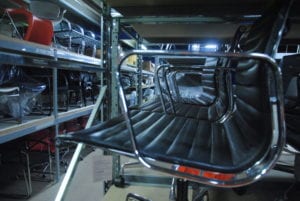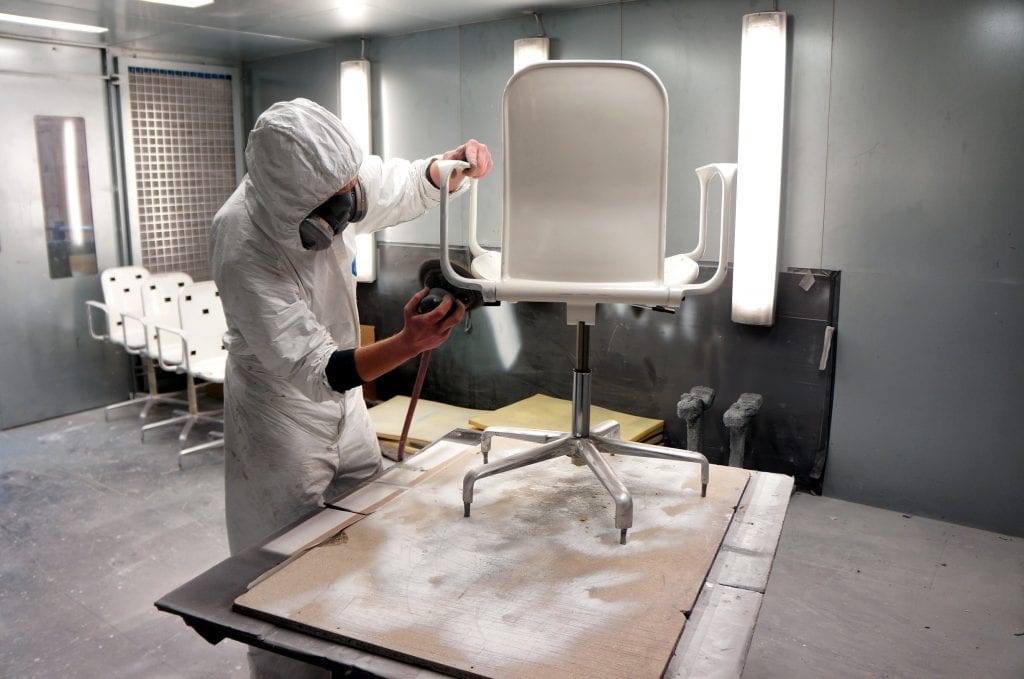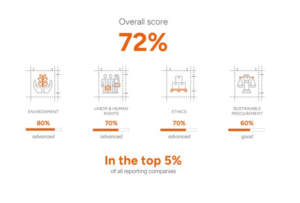Drawing social value from circular services
The environmental arguments for moving to circular business practices are extensive and are well known amongst those already following the principles. But what are the wider social benefits for an organisation moving towards circularity, and how can identifying these benefits help to drive the agenda?
This post was originally written by Ann Beavis for a Business in the Community blog.
I was challenged to talk about ‘social circularity’ as part of the workshop being held at the Futurebuild event. This led me to reflect on the broader scope of delivering more circular services, and what the positive impacts on business include. There are measurable environmental results in terms of carbon savings, water usage etc. but we must not forget those social outcomes that are difficult to quantify yet wholeheartedly positive.
Journey into circular service development
We operate a range of sustainable services for redundant office furniture and IT/AV equipment – this includes sustainable clearances, resale, donation, remanufacturing, refurbishment, repair and recycling operations. In 2016, Crown Workspace, who acquired Premier Workplace Services, were rewarded with the Queen’s Award for Enterprise for Sustainable Development for our contributions to sustainability.
Our journey into circular service development meant looking at an existing business model and recognising particular areas of market failure, identifying those points at which the easiest decision was to waste rather than reuse a redundant asset. Through market and client research we evolved a service offering and invested in the resources required to deliver. Having a core ethos of sustainability at the heart of the operation resulted in key social benefits through all areas of service provision.

The social benefits of developing a circular service
Here we have captured an overview of the main social benefits of developing a circular service:
Increased employment
Auditing, segregating and managing assets is much more labour intensive than handling them, but in protecting their value the cost of additional labour can be recovered and additional value still achieved. When we changed the way that office clearances were delivered, we immediately increased the work resource needed.
Highly/multi-skilled roles
Repair, refurbishment and reuse of assets create the needs for a more skilled workforce than in simply managing waste. At the Renew Centre (where we fulfil the refurbishment of office furniture) we have 15 full-time staff covering a range of highly-skilled roles. We are learning and teaching how to remake items and help improve them for future extended use. The team’s expertise increases with investment and becomes an asset.

Apprenticeships into new dynamic roles
New business operations lead to new roles and circular services can require a different approach regarding new skill development. Through investing in the Renew IT service, we have created IT apprenticeships focused on the repair, reuse and reselling of IT and AV equipment, enabling it to be data wiped securely and put back into reuse.
Significant financial and well-being benefits to charities
Donating unneeded resources to those who are in need and have zero budget is a great way of delivering social value. There is an increasing number of online platforms that can facilitate this activity. Our Giving Back Project has enabled FMs to divert thousands of redundant items from offices into charities, schools and social enterprises. This also helps larger organisations to meet their CSR targets.
Reduction in furniture poverty
In the UK, we have a huge problem with furniture poverty, and those who can least afford it only have punitive financial options for securing furniture they cannot afford. Responsible business delivery can and should support those most vulnerable in our society. Our services work towards alleviating furniture poverty.

Attracting a supportive workforce
The younger workforce has become more discerning when selecting potential employment possibilities. This highly-engaged workforce does not like to see an employer wasting money, assets or resources. Staff and clients can benefit from a greater sense of satisfaction if the services they engage with have stronger social outcomes.
The importance of social value
These are just some of the ways in which our circular service provision is delivering wider social benefit. I am sure that as businesses move towards more circular development, they too can harness these additional social benefits being achieved. This will become more business-critical for many, as recent political developments have focused on the importance of social value.
Whilst reporting on financial and carbon savings does exist, there is also some immeasurable value in making a real difference in the lives of those who need it most. The support we have provided to homeless charities in particular, such as St Mungo’s and City YMCA, has meant that we genuinely have taken one person’s waste and enabled it to become the wealth of someone at their greatest time of need. There are no metrics for that.
Related stories
In this blog, we delve into workplace consultancy, exploring the intricacies of workplace change and space utilisation strategies and their profound implications for businesses.
Sustainability remains a top business priority for Crown in the UK & Ireland and globally; we are therefore delighted to have launched our 2023 UKI Sustainability Report!
Crown are delighted to announce that we have been awarded Gold by EcoVadis in 2024 for the second time, reflecting our commitment to and progress in becoming a responsible business.




















